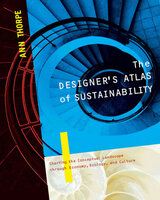2 books about Design, Industrial

The Designer's Atlas of Sustainability
Ann Thorpe
Island Press, 2007
Designing for sustainability is an innovation shaping both the design industry and design education today.Yet architects, product designers, and other key professionals in this new field have so far lacked a resource that addresses their sensibilities and concerns. The Designer's Atlas of Sustainability now explores the basic principles, concepts, and practice of sustainable design in a visually sophisticated and engaging style. The book tackles not only the ecological aspects of sustainable design-designers' choice of materials and manufacturing processes have a tremendous impact on the natural world-but also the economic and cultural elements involved.
The Atlas is neither a how-to manual nor collection of recipes for sustainable design, but a compendium of fresh approaches to sustainability that designers can incorporate into daily thinking and practice. Illuminating many facets of this exciting field, the book offers ideas on how to harmonize human and natural systems, and then explores practical options for making the business of design more supportive of long-term sustainability. An examination of the ethical dimensions of sustainable development in our public and private lives is the theme present throughout. Like other kinds of atlases, The Designer's Atlas of Sustainability illustrates its subject, but it goes far beyond its visual appeal, stimulating design solutions for "development that cultivates environmental and social conditions that will support human well-being indefinitely."
The Atlas is neither a how-to manual nor collection of recipes for sustainable design, but a compendium of fresh approaches to sustainability that designers can incorporate into daily thinking and practice. Illuminating many facets of this exciting field, the book offers ideas on how to harmonize human and natural systems, and then explores practical options for making the business of design more supportive of long-term sustainability. An examination of the ethical dimensions of sustainable development in our public and private lives is the theme present throughout. Like other kinds of atlases, The Designer's Atlas of Sustainability illustrates its subject, but it goes far beyond its visual appeal, stimulating design solutions for "development that cultivates environmental and social conditions that will support human well-being indefinitely."
[more]

Discovering Design
Explorations in Design Studies
Edited by Richard Buchanan and Victor Margolin
University of Chicago Press, 1995
Discovering Design reflects the growing recognition that the design of the everyday world deserves attention not only as a professional practice but as a subject of social, cultural, and philosophic investigation. Victor Margolin, cofounder and an editor of the journal Design Issues, and Richard Buchanan, also an editor of the journal, bring together eleven essays by scholars in fields ranging from psychology, sociology, and political theory to technology studies, rhetoric, and philosophy. The essayists share the editors' concern, first made clear in Margolin's Design Discourse: History, Theory, Criticism, with the the development of design studies as a field of interdisciplinary research.
The contributors (Gianfranco Zaccai, Albert Borgmann, Richard Buchanan, Augusto Morello, Tufan Orel, Nigel Cross, Victor Margolin, Langdon Winner, Carl Mitcham, Tony Fry, and Ezio Manzini) focus on three broad themes that form a sequence of fundamental issues: how to shape design as a subject matter, how to distinguish the activity of designing in the complex world of action, and how to address the basic questions of value and responsibility that persistently arise in the discussion and practice of design. The editors' introduction provides a useful overview of these questions and offers a multidisciplinary framework for design studies. The essays discuss such topics as the relation of aesthetics to technology, the place of design in social action, the role of the consumer in design decisions, and the need for ethical practice in contemporary design. Manzini's concluding essay shows how the issue of ethics should connect responsible behavior to decisions made every day in the manufacture of objects.
The contributors (Gianfranco Zaccai, Albert Borgmann, Richard Buchanan, Augusto Morello, Tufan Orel, Nigel Cross, Victor Margolin, Langdon Winner, Carl Mitcham, Tony Fry, and Ezio Manzini) focus on three broad themes that form a sequence of fundamental issues: how to shape design as a subject matter, how to distinguish the activity of designing in the complex world of action, and how to address the basic questions of value and responsibility that persistently arise in the discussion and practice of design. The editors' introduction provides a useful overview of these questions and offers a multidisciplinary framework for design studies. The essays discuss such topics as the relation of aesthetics to technology, the place of design in social action, the role of the consumer in design decisions, and the need for ethical practice in contemporary design. Manzini's concluding essay shows how the issue of ethics should connect responsible behavior to decisions made every day in the manufacture of objects.
[more]
READERS
Browse our collection.
PUBLISHERS
See BiblioVault's publisher services.
STUDENT SERVICES
Files for college accessibility offices.
UChicago Accessibility Resources
home | accessibility | search | about | contact us
BiblioVault ® 2001 - 2024
The University of Chicago Press









